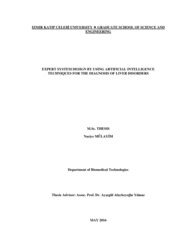Expert system design by using artificial intelligence techniques for the diagnosis of liver disorders
-
Eser Sahibi
Mülayim, Naciye
- Tez Danışmanı Ayşegül Alaybeyoğlu YILMAZ
-
Tür
Yüksek Lisans
- Yayın Tarihi 2016
-
Yayıncı
İzmir Katip Çelebi Üniversitesi Fen Bilimleri Enstitüsü
- Tek Biçim Adres Http://hdl.handle.net/11469/651
-
Konu Başlıkları
Yapay zekâ teknikleri
Artificial intelligence techniques
Karaciğer rahatsızlıkları
Liver disorders
Nowadays, Expert System (ES)s are used widely in many areas to solve real world problems. Artificial Intelligence (AI) techniques are used to obtain timely and accurately decision about solution of daily problems in ESs designing because AI can mimic behaviours and thought system of people. Especially in medical area, there are many researches and applications using ESs based on various AI techniques to obtain diagnosis for any diseases.
The liver is a vital internal organ for a human body and it has many functions, which are associated with the other organs. Although the liver can renew itself in the face of a damage and ¼ of liver can even be enough for liver functions, a major damage is an obstacle for continual of the liver functions. For this reason, early diagnosis is very important in liver disorders.
In this study, it was intended to generate expert systems based on Firefly Algorithm (FA) and Support Vector Machine (SVM) techniques for the diagnosis of liver disorders by using C# programming language and “Indian Liver Patient Dataset (ILPD)” and “Liver Disorder Dataset (BUPA Dataset)”. For performance evaluations of the proposed systems Accuracy, Positive Predictive Value, Negative Predictive Value, Sensitivity, Specificity, Precision and F-Measure were used.
For ILPD, the proposed system based on Firefly Algorithm (FA) gave 92% Accuracy, 92% Sensitivity, 84.61 % Specificity, 95.91 % Positive Predictive Value, 83.01 % Negative Predictive Value, 95.91 % Precision and 93.91 % F-Measure. The proposed system based on Support Vector Machine (SVM) gave 78.33% Accuracy, 79.9% Sensitivity, 75% Specificity, 87.16 % Positive Predictive Value, 63.71 % Negative Predictive Value, 87.16 % Precision and 83.37 % F-Measure.
For BUPA Dataset, the proposed system based on Firefly Algorithm (FA) gave 92.8% Accuracy, 96% Sensitivity, 90.66 % Specificity, 87.27 % Positive Predictive Value, 97.14 % Negative Predictive Value, 87.27 % Precision and 91.42 % F-Measure. The proposed system based on Support Vector Machine (SVM) gave 76.8 % Accuracy, 82% Sensitivity, 73.33% Specificity, 67.21 % Positive Predictive Value, 85.93 % Negative Predictive Value, 67.21 % Precision and 73.87 % F-Measure.
It was clearly observed that the proposed system based on FA gave more successful predictions than the proposed system based on SVM in both liver disorders datasets and it is hoped that the generated systems will make contribution to in researches of expert systems based on artificial intelligence.
-
Koleksiyonlar
ENSTİTÜLER
FEN BİLİMLERİ ENSTİTÜSÜ

 Tam Metin
Tam Metin

